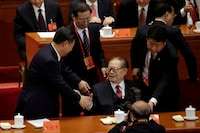Jiang Zemin, the former Chinese president who died Wednesday, was a pivotal figure during his more than decade of leadership. He was unexpectedly chosen to head the Chinese Communist Party after the 1989 Tiananmen Square massacre, and during his tenure, the country harnessed capitalism to become a global economic player.
In China, former president Jiang’s death comes at an unsettled time

“His passing could become a focal point for people who are unhappy with the current economic environment and incessant covid lockdowns,” said Mary Gallagher, director of the Center for Chinese Studies at the University of Michigan.
In fact, the deaths of former leaders have often been times of turbulence for the party, when internal division and power struggles can break out into broader social unrest. The death of reform-minded leader Hu Yaobang in April 1989 was the trigger for a wave of demonstrations in support of freedom of speech and democratic reforms that became known as the Tiananmen Square protests. Jiang took charge in the wake of the bloody crackdown there.
China today is vastly different from the country compared with 1989, however, and there are few signs of a schism among the top party officials. President Xi Jinping is arguably the country’s most powerful leader since Mao Zedong.
“Xi Jinping has already held power for a decade and changeover at the top is complete, so there’s little chance of internal elites using the opportunity” to challenge him, said Chien-wen Kou, a political scientist at National Chengchi University in Taiwan.
National flags will be flown at half-staff for Jiang over Tiananmen Square in Beijing, government buildings nationwide and Chinese embassies abroad until the end of memorial services. State media reported Wednesday afternoon that no foreign government leaders or dignitaries would be invited.
All the attention to Jiang’s legacy poses some risk to Xi and his top hierarchy.
“Once famous leaders pass they are often eulogized during vigils [and] remembered as a vanguard of present-day values and societal demands,” said Andreas Fulda, a political scientist at the University of Nottingham. “This is why the Chinese Communist Party has every reason to fear public mourning following Jiang’s passing.”
Party elders picked Jiang to replace General Secretary Zhao Ziyang amid the party’s greatest crisis in the post-Mao era. He oversaw a propaganda and political-thought campaign to reinstate control after Tiananmen. He later combined that effort with economic liberalization as China prepared to join the World Trade Organization in 2001.
He was no political reformer. After a protest in downtown Beijing in 1999 by members of the Falun Gong spiritual movement, Jiang banned the practice and jailed many of its core adherents.
Yet some Chinese intellectuals recall his time in power more positively. There was a sense of opportunity as the country was growing richer, opening up to the world and getting along with the existing international order — a stark contrast to China under Xi.
“He let us take a big step forward toward the goal of becoming a normal country,” said a retired professor from a top university in Beijing. “I was not very satisfied with him back then, but looking back, he was still a relatively normal leader.”
“In the Jiang era, I often scolded him, and it was fine,” added the scholar, who spoke on the condition of anonymity for fear of reprisals. “But now if we scold the current leader, we will go to prison.”
Over the past decade, Xi has centralized power to a greater degree than Jiang or his successor Hu Jintao. He now has a tight grip on the internal party discipline apparatus and the security state. At the twice-per-decade meeting of the top leadership in October, he promoted loyal lieutenants to senior positions and broke with norms of succession followed by Jiang and Hu.
In what outside observers interpreted as sign of Xi’s total dominance, the 79-year-old Hu was unceremoniously escorted out midway through the closing session. State media later said he had been feeling unwell.
Comparisons are perhaps inevitable, Gallagher noted. Even though Jiang pursued difficult state-sector reforms that left millions unemployed, what people are most likely to conclude when thinking about China then and now is that the country today “is more closed and more repressive.”
A degree of nostalgia for Jiang has spread among the younger generation in recent years. An internet subculture known as “toad worship,” a reference to Jiang’s square-rimmed glasses and high-waisted pants, created half-mocking, half-affectionate memes about the former leader to share on his birthday.
On the Chinese microblog Weibo, fans of Jiang posted memorials on Wednesday afternoon about how he “integrated China into the world.” One popular commentator remembered that, under Jiang, foreign movies were shown in Chinese theaters without being censored and the Chinese national soccer team made it into the World Cup.
But, the commentator wrote, “his era is over.”






